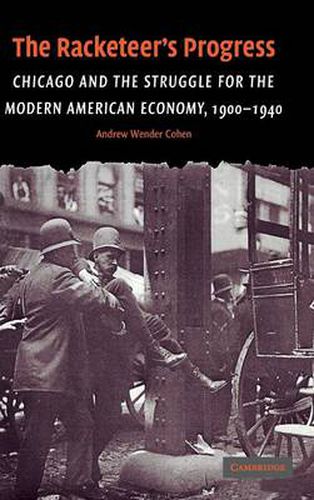Readings Newsletter
Become a Readings Member to make your shopping experience even easier.
Sign in or sign up for free!
You’re not far away from qualifying for FREE standard shipping within Australia
You’ve qualified for FREE standard shipping within Australia
The cart is loading…






The Racketeer’s Progress explores the contested and contingent origins of the modern American economy by examining the violent resistance to its development. It explains how carpenters, teamsters, barbers, musicians, and others organized to thwart ambitious national corporations. Unions and associations governed commerce through pickets, assaults, and bombings. Scholars often ignore this defiance, painting modernization as a consensual process and presenting craftsmen as reactionary, corrupt, and criminal. This is ironic, for the tradesmen’s reputation derives from their successful struggle to control modernization and the emerging consumer economy. Their resistance redirected American law. Progressive-era courts rebuked the craftsmen for attempting to govern trade. In the 1920s, the tradesmen inspired new criminal concepts, such as ‘racketeering’. But the Great Depression reversed harsh laws. The craftsmen became a model for New Deal recovery statutes and a focus for constitutional debates. Meanwhile, the state began protecting unions against gangsters like Al Capone.
$9.00 standard shipping within Australia
FREE standard shipping within Australia for orders over $100.00
Express & International shipping calculated at checkout
The Racketeer’s Progress explores the contested and contingent origins of the modern American economy by examining the violent resistance to its development. It explains how carpenters, teamsters, barbers, musicians, and others organized to thwart ambitious national corporations. Unions and associations governed commerce through pickets, assaults, and bombings. Scholars often ignore this defiance, painting modernization as a consensual process and presenting craftsmen as reactionary, corrupt, and criminal. This is ironic, for the tradesmen’s reputation derives from their successful struggle to control modernization and the emerging consumer economy. Their resistance redirected American law. Progressive-era courts rebuked the craftsmen for attempting to govern trade. In the 1920s, the tradesmen inspired new criminal concepts, such as ‘racketeering’. But the Great Depression reversed harsh laws. The craftsmen became a model for New Deal recovery statutes and a focus for constitutional debates. Meanwhile, the state began protecting unions against gangsters like Al Capone.